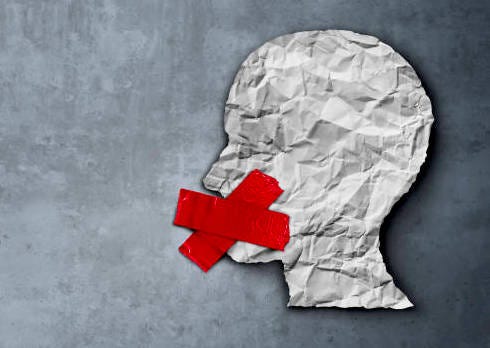Self-Censorship
You're free to say anything except...
There are many ways to censor speech and expression. The government can do it, and actively does in many countries around the world. Big tech can do it, if we’ve learned anything over the past few years. But there’s no better way to censor someone than by allowing them to do it themselves.
It starts innocently enough. We’re politely asked to watch the words we use so as to be more sensitive to others. Fair enough. Even if these requests seem irrational at times. Then we’re told that it’s best to avoid certain conversations as they may cause pain to others. And, who wants to cause pain to others? We’re not heartless monsters after all. Over time, these requests become increasingly frequent, demanding and decidedly less polite. Hostile, even. You see people around you get iced out for the smallest social transgressions, or worse, lose their livelihood or be publicly destroyed.
You no longer need to be asked twice. You get the message.
It may seem like a voluntary act on its surface, but it’s not when it’s done out of fear or by coercion. And while some level of being cautious with one’s speech might be healthy and considerate within a functioning society, when the radius of what’s acceptable and what isn’t continues to quickly expand to more and more areas—it becomes downright dangerous.
On a mass scale, it’s a threat to the evolution and exchange of ideas, art, science, and the very fabric of our society. It stifles our understanding of the world.
This alarming trend has taken root in many institutions from educational to scientific.
But, I’d argue, one of the most treacherous captures is that of our art and culture, which have often been the grandest narrators of the human condition. They hold up a mirror to us and reflect truth in the most indirect and yet somehow—most direct—of ways.
As at least one prolific writer confided in me, a seminal piece of writing which changed not only his own life, but also the lives of many others, would be unlikely to exist today. He would be too fearful to write it in the current climate. Is it a racist or bigoted book? It must be, right? Not in the least. The characters just happen to not always be the nicest of people.
Of course, not everyone self-censors to the same extent, but through the many conversations I’ve had with highly uncontroversial and often prolific artists and writers, it’s clear that the waters have become treacherous to navigate. So much so that some have given up altogether.
What transformative works of art and eloquent verbal combinations are we being pillaged and deprived of? And how will their absence affect us in years to come?
If the lessons of history have taught us anything, in places like the U.S.S.R. where censorship reigned supreme, artists can be a resourceful bunch and have found ways to make subversive art. Though, not all were equally successful at getting away with it and many were prosecuted.
But do we really want to get to that point? Inch by inch, by creating environments where fear dominates discourse?
It only starts as self-censorship. Ask yourself: If you’re afraid of speaking truth, do you truly live in a free society?
If you’re enjoying these posts, please make sure you like, subscribe, share with others, and leave a comment with your thoughts or future topic suggestions. Anything you do, means a lot. It helps me feel a little less alone in this world.
☕️ Want to support my work by buying me a coffee? Here’s how.
Who am I? I’m a writer with an overactive imagination and a random mind. Outside of Substack, you’ll find my work in publications such as Newsweek, WIRED, Variety, The Washington Post, The Guardian, Esquire, Playboy, Mashable, CNN Travel, The Independent, and many others.
Here, you can expect to see little essays on topics ranging from self-censorship, how to have better conversations and word misappropriation to whimsical thoughts about losing imaginary friends and insomnia. Anything goes. Here, there’s no “left,” “right,” or even “middle”. Just random thoughts. And everyone’s welcome to be part of the conversation—in fact, it’s encouraged.





My wife grew up in China....the govt excels at thought control..
1984 isn't fiction, its a playbook..
I am afraid. I just got suspended from Twitter for using the phrase "poison the well" because some anonymous person complained I'm promoting self harm. This happened after I defended J. K. Rowling.